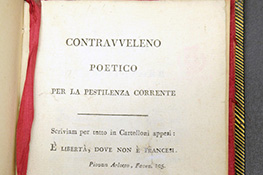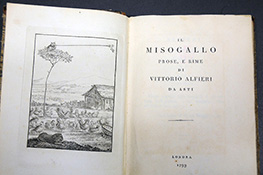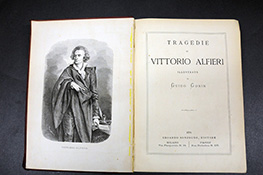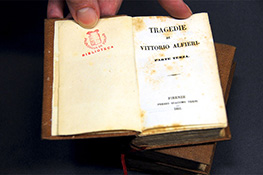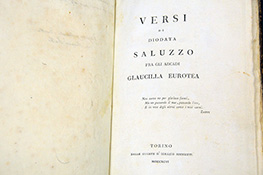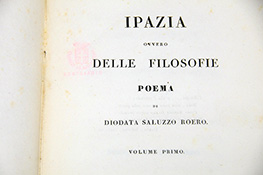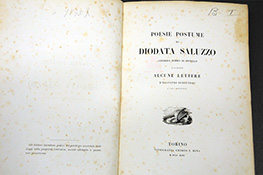Versione italiana English version Version française Versión en español
Tragedies and heroes, romantic soul landscapes copied by nature. Between Illuminism, Sturm und Drang and historical-fantasy composition of feelings: in Piedmont Vittorio Alfieri (1749-1803) and Diodata Saluzzo di Roero (1774-1840), noble woman and literate belonging to Ludovico di Breme circle.
By the great writer from Asti, model of a whole generation of romantic, from Foscolo to Leopardi to Gioberti to Carducci, the Historical Library preserves many editions of the works, many valuable for their rarity. From the original edition of the tragedies (Siena 1783) Agamennone, Oreste e Rosamunda to the Venetian (1792) of Agide, Antigone, Filippo, Oreste, Sofonisba and Timoleone, to the posthumous edition of Bettoni (Padova 1809-11), o the one illustrated by Gonin (Milan 1870). The works printed in Florence in 1806 (dated London 1804) can be found too, like the "tramelogedy" Abele, in wich many human characters act in tragic parts and supernatural ones in melodramatic parts, the Rime, the Satire and the Commedie (first edition). In the Anselmi Fund we can find Vita e poesie, containing the famous autobiography, the rimes, the tragedies and the commedies (Mayno, Piacenza 1810-11). The original edition of Misogallo (London 1799) is really interesting and rare, with the coeval Contravveleno poetico per la pestilenza corrente, published in Florence (part of Misogallo). In the end the first edition of the treaty Della tirannide (Turin 1800).
Diodata Saluzzo, daugther of Giuseppe Angelo Saluzzo from Monesiglio, who in 1758 founded the Scientific Society of Turin with Luigi Lagrange, started in her early twelves to compose poems that will be appreciated by Foscolo, Parini, Monti, Alfieri. Student of Carlo Denina and Tommaso Valperga di Caluso, she was author of the little poem Rovine which was appreciated by Manzoni and became part of the Arcadia Accademy with the name Glaucilla Eurotea. In 1823 she composed the historical tragedy Il castello di Binasco and, with Alfieri's death, the elegy Melpomene (1804). The historical Library preserves the original edition of Castello di Binasco (Parenti Fund) and the first edition of the poem Ipazia (1827). Interesting are the Letters, containing her correspondence with Alfieri (1876), the rare Versi published in Turin in 1796 and the edition of Poesie postume (aggiunte alcune lettere di illustri scrittori a lei dirette) (Turin 1843).

